Imagine being a freelancer with a lot of clients, short deadlines, and an endless list of things to do. Does this ring a bell? Now, imagine a virtual assistant that does the same things over and over, comes up with new ideas, and helps you get your work done faster and better. That’s how AI will work in 2025.
As a freelancer, I’ve seen how technology can change the way you do your job. I’m excited to tell you about the best AI tools for freelancers that could help you move up in your career. These AI tools will help you work smarter, not harder, whether you’re writing blog posts, making logos, or coding apps. They will also help you make more money.
Freelancing is thriving, with over 70 million freelancers in the U.S. contributing $1.3 trillion to the economy annually, according to Upwork’s 2024 Freelance Forward report. With a lot of freedom comes with many responsibility—like managing clients, meeting deadlines, and staying competitive can be overwhelming.
Table of Contents
AI tools are here to reduce the workload, offering time savings, scalability, and a competitive edge. Let’s how these tools will change the game for your freelancing business in the year 2025.
Why AI Tools Are a Game-Changer for Freelancers in 2025
Freelancing isn’t just a side hustle anymore—it’s a full-blown career for millions. But let’s be honest: it’s tough to balance creativity with administrative tasks like invoicing or client communication. AI tools are changing the game by automating the mundane, enhancing your creative output, and giving you a leg up in a crowded market. Here’s why they’re essential:

- Save Time: AI can shave 10–15 hours off your workweek by automating tasks like drafting content, scheduling, or analyzing data.
- Scale Your Business: Tools like ChatGPT and Notion AI let you take on more clients without sacrificing quality.
- Earn More: Upwork’s 2025 data shows freelancers using AI earn 40% more per hour than those sticking to traditional methods.
- Boost Creativity: AI tools help you get work done faster and better, from coming up with blog post ideas to making graphics.
Top AI Tools for Freelancers in 2025
Are you ready to move up a level? These are the best AI tools for freelancers in 2025. Each one is made for a different job, like writing or managing projects.
1. ChatGPT (OpenAI)
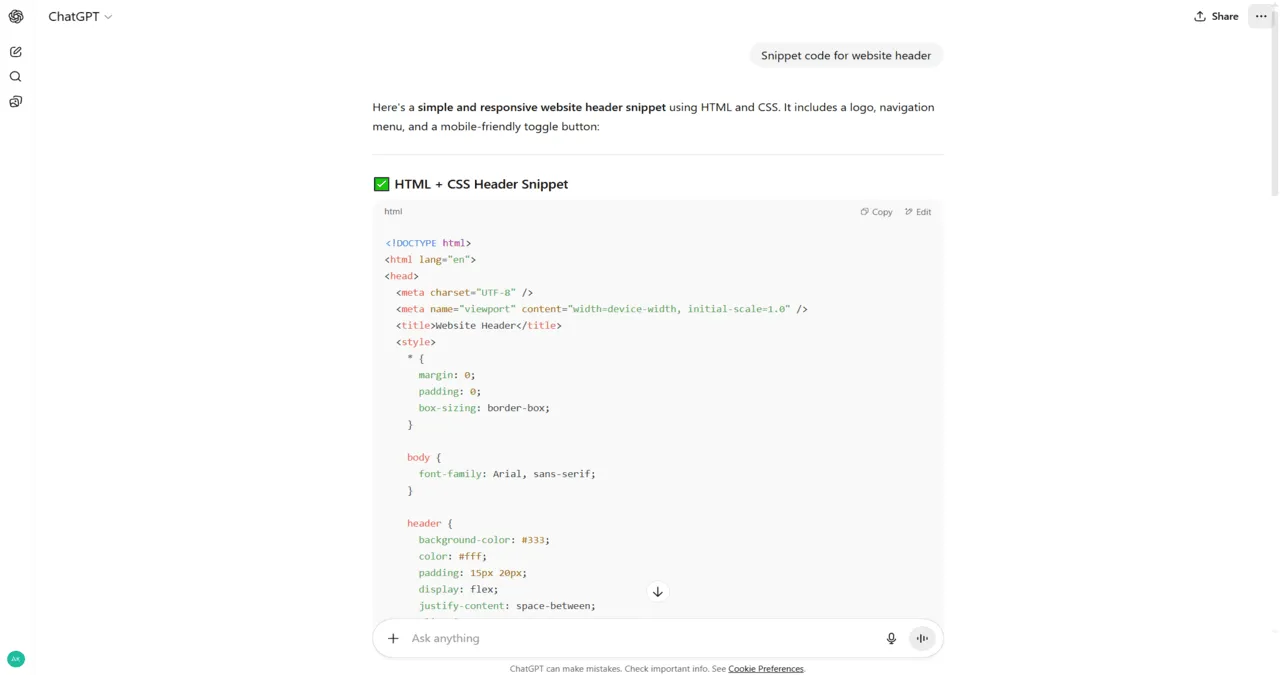
Best For: Content creation, coding, research, client communication
Pricing: Free tier; Plus ($20/month), Team, Pro plans available
Why It’s Great: With 400 million users worldwide, ChatGPT is the ultimate all-in-one AI tool. Writers can whip up blog outlines, marketers can craft email campaigns, and developers can debug code in seconds. Deep Research mode, which is only available in paid plans, gets answers from the web that are very detailed, making it great for projects that need a lot of research.
Example of a real-life use case: Sarah, a freelance content marketer, used ChatGPT’s content brief generation to cut her content planning time from four hours to thirty minutes.
Pro Tip: Use the free tier for quick tasks, and if you need more advanced features like file analysis and higher usage limits, upgrade to Plus.
2. Grammarly
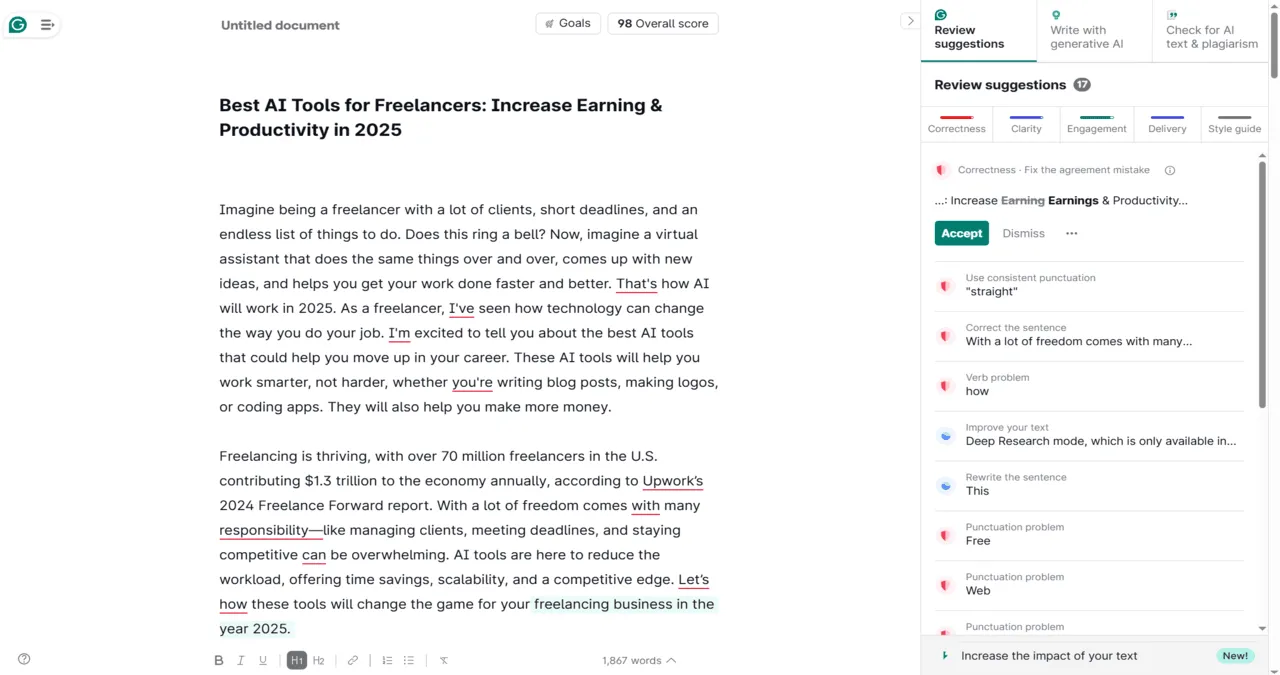
Best For: Writing, editing, and professional communication
Pricing: Free plan; Premium (~$12/month)
Why It’s Great: Grammarly works with more than 500,000 apps and gives you suggestions for grammar, style, and tone in real time. Its AI-powered tone adjustment and plagiarism checker make sure that your work is original and that you sound professional and friendly at the same time.
Real-World Use Case: A freelance copywriter reduced editing time by 20% with Grammarly Premium, delivering polished content faster.
Pro Tip: Install the browser extension for seamless integration with Google Docs and email platforms.
3. Canva AI (Magic Design)
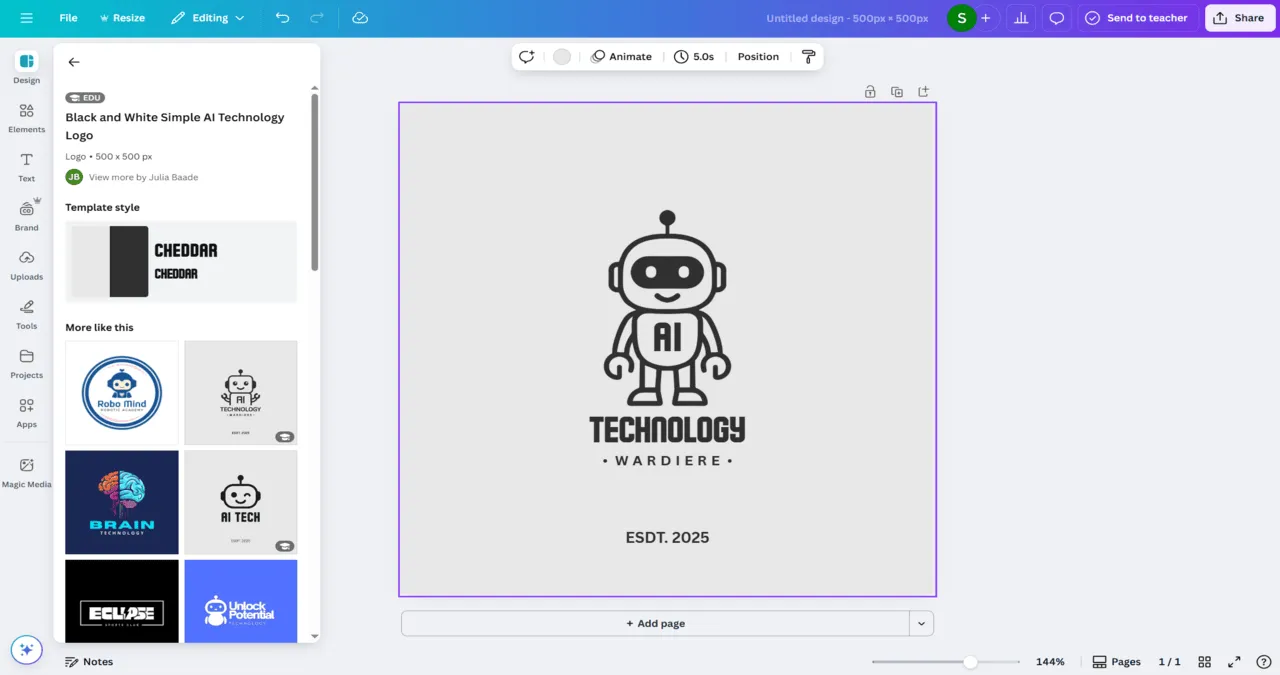
Best For: Graphic design, social media visuals, presentations
Pricing: Free plan; Pro (~$15/month)
Why It’s Great: Canva’s Magic Design turns text prompts into professional visuals, perfect for non-designers. Create logos, social media posts, or slide decks in minutes with AI-powered auto-resize and background removal tools.
Real-World Use Case: A freelance social media manager created a month’s worth of Instagram posts in one afternoon, boosting client engagement by 15%.
Pro Tip: Use Canva’s templates for consistent branding across client projects.
4. Notion AI
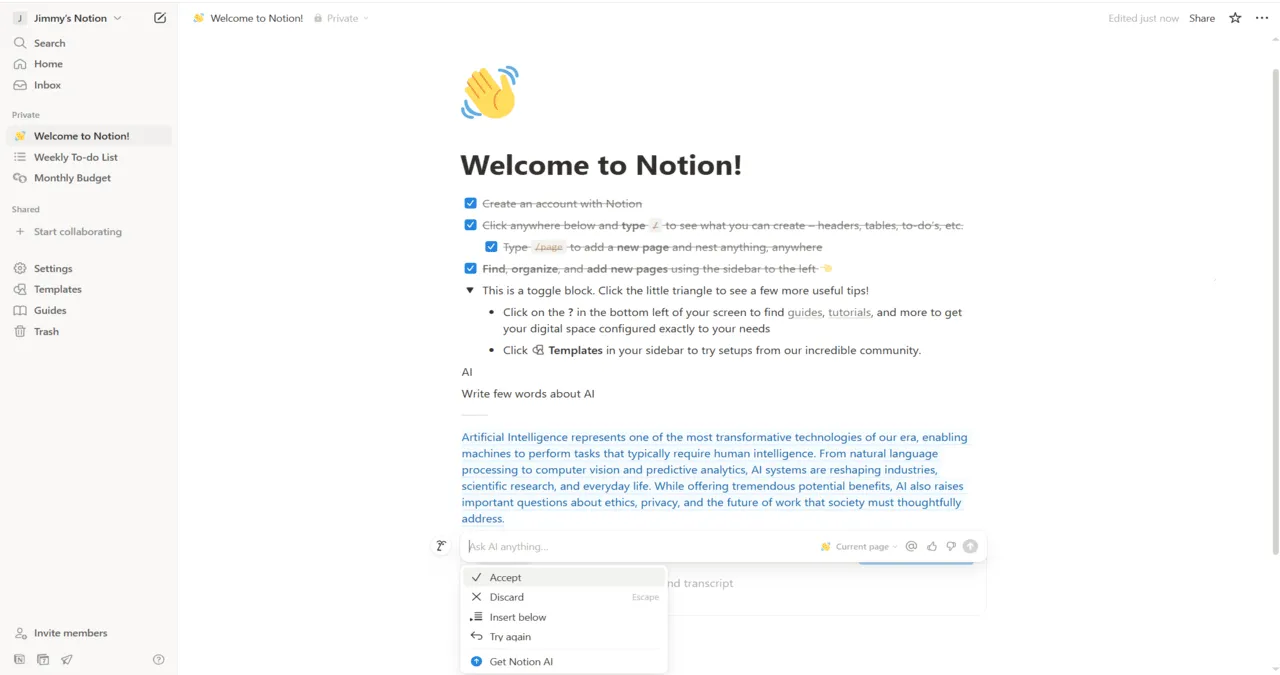
Best For: Project management, note-taking, CRM
Pricing: Add-on (~$10/user/month, billed annually)
Why It’s Great: Notion AI can summarize documents, write text, and answer questions based on your workspace. This makes it great for handling many clients at once. Its Q&A feature looks through your database for quick answers, so you don’t have to go through your notes.
Real-World Use Case: A freelance project manager automated meeting note summaries, saving 5 hours weekly.
Pro Tip: To make your work easier, make custom databases to keep track of clients.
5. Perplexity AI
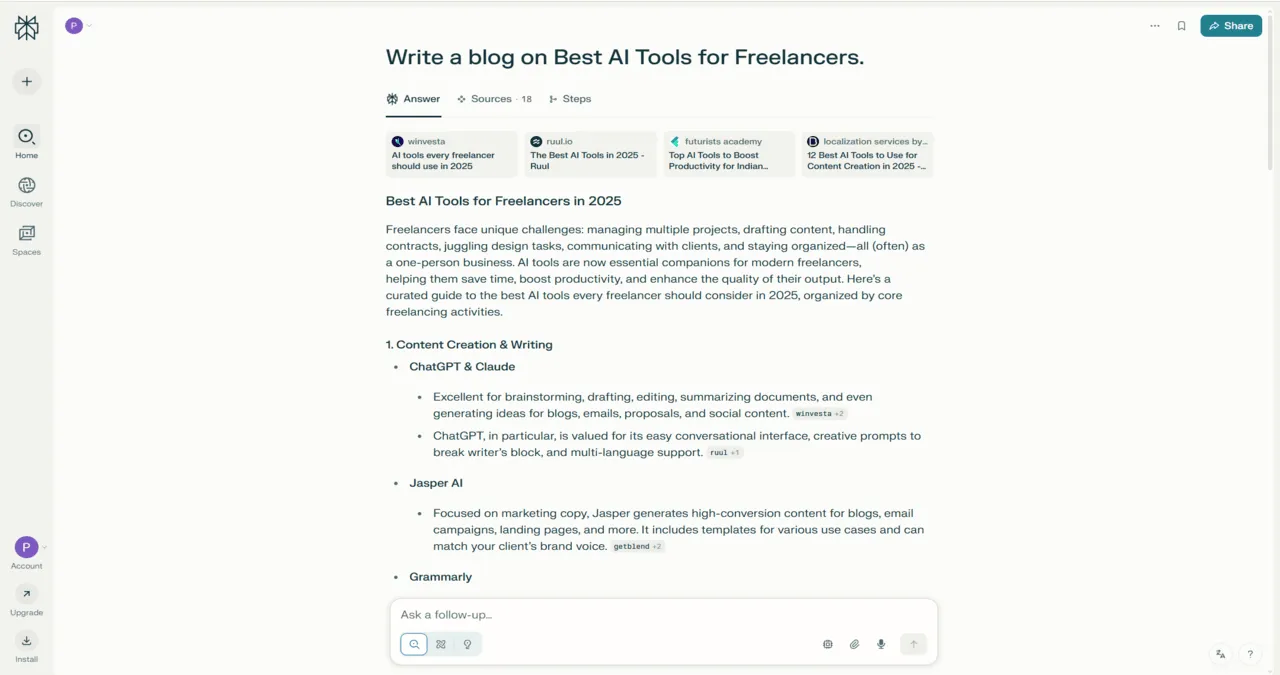
Best For: Research, data-driven insights
Pricing: Free with limits; Pro (~$20/month)
Why It’s Great: Perplexity delivers concise, sourced answers, outperforming traditional search engines for niche research. Its citation feature makes sure that the information is correct, which is in line with Google’s E-E-A-T principles.
Real-World Use Case: A freelance consultant compiled a market analysis report in 2 hours instead of 8 using Perplexity.
Pro Tip: Use the Pro plan for complex research tasks requiring deeper web analysis.
6. DeepL
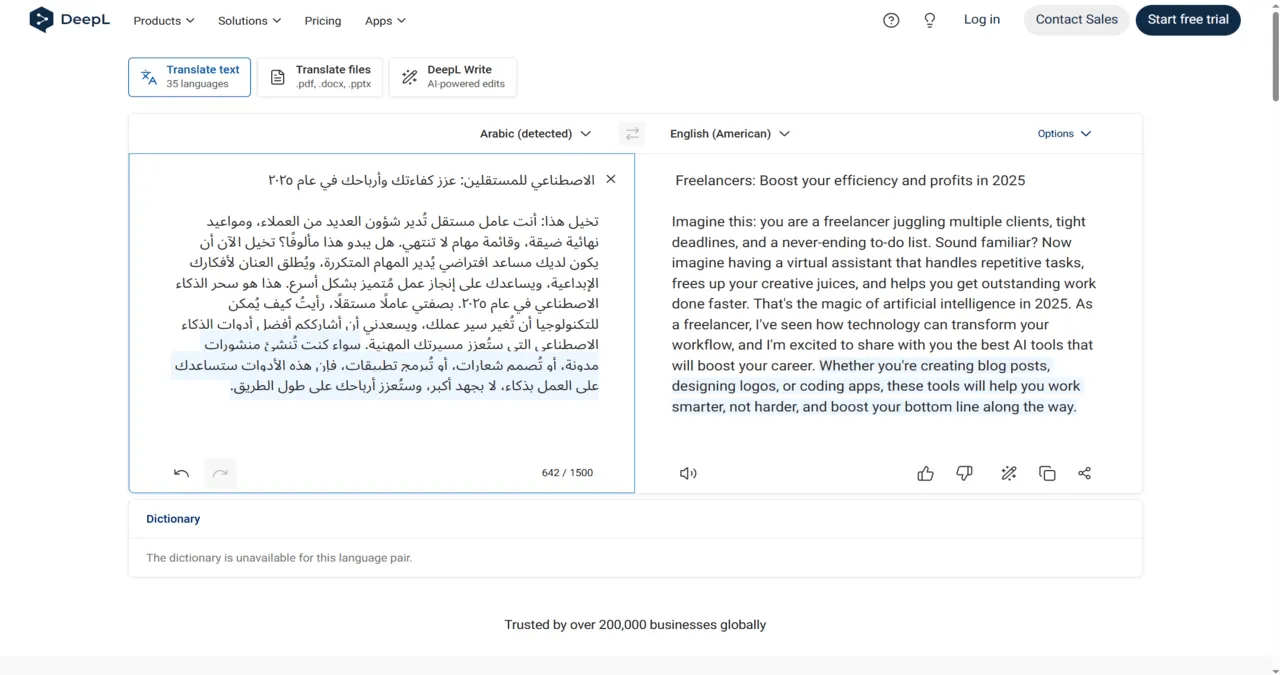
Best For: Translation, multilingual communication
Pricing: Free for limited use; Pro (~$8.74/month, billed annually)
Why It’s Great: DeepL’s context-aware translations in 31 languages surpass Google Translate, ensuring professional communication for global clients.
Real-World Use Case: A freelance translator delivered a 5,000-word project in half the time, increasing client satisfaction.
Pro Tip: Use DeepL Write for refining tone in multilingual emails.
7. Zencoder
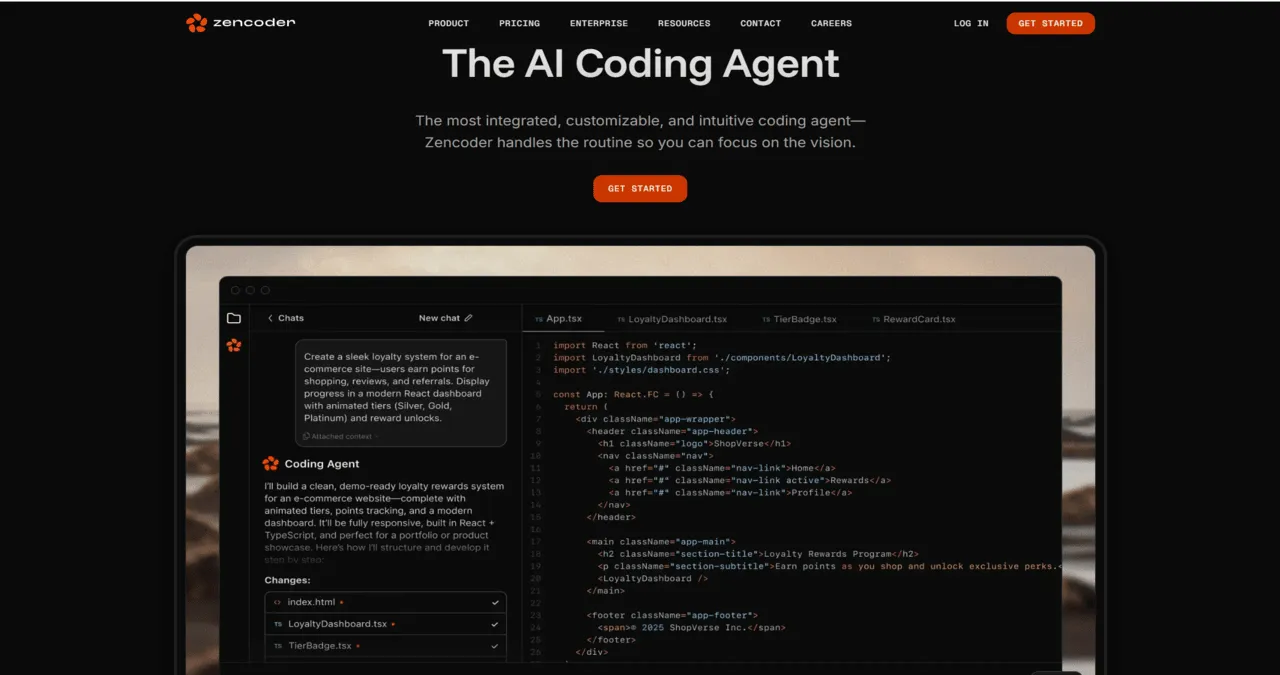
Best For: Coding, development
Pricing: Free trial; pricing varies
Why It’s Great: Zencoder generates optimized Python code from natural language prompts, automating repetitive tasks like API routing for developers.
Real-World Use Case: A freelance web developer automated boilerplate code in the real world, which cut the time it took to finish a project by 30%.
Pro Tip: Use Zencoder with GitHub to make code integration easy.
8. Clockify
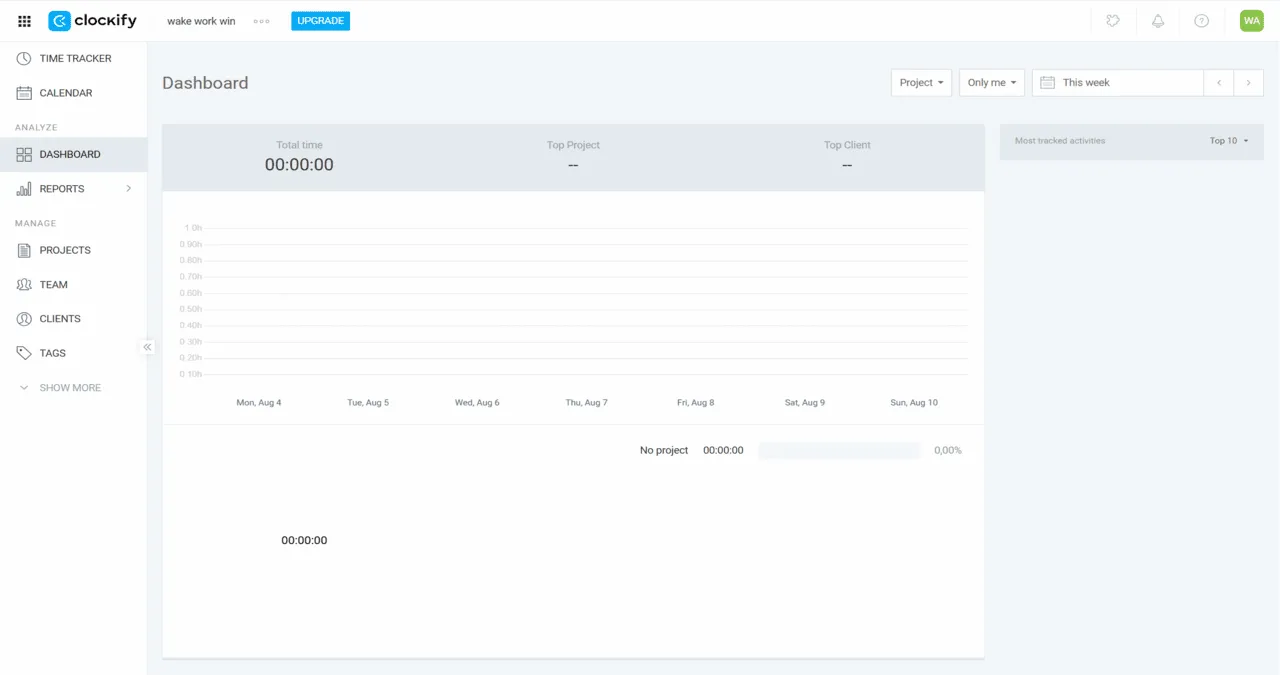
Best For: Time tracking, productivity analysis
Pricing: Free plan; Premium (~$10/month)
Why It’s Great: Clockify’s AI-powered reports look at how time is spent, which helps you make better schedules and get more billable hours. It works with Trello and Asana to make it easier to keep track of projects.
Real-World Use Case: A freelance designer used Clockify to find time sinks, which led to a 15% increase in billable hours.
Pro Tip: Use the free plan for solo freelancers; upgrade for team collaboration features.
Table: Comparison of AI Tools for Freelancers
| Tool | Best For | Pricing (Monthly) | Key Feature | Integration Examples |
|---|---|---|---|---|
| ChatGPT | Content, coding, research | Free; $20 (Plus) | Deep Research mode | Google Docs, Slack |
| Grammarly | Writing, editing | Free; ~$12 | Plagiarism checker | Google Docs, email platforms |
| Canva AI | Graphic design | Free; ~$15 | Magic Design text-to-visual | Social media platforms |
| Notion AI | Project management | ~$10 (add-on) | Document summarization | Trello, Slack |
| Perplexity | Research | Free; $20 (Pro) | Cited, concise answers | Web browsers |
| DeepL | Translation | Free; ~$8.74 | Context-aware translations | Email platforms |
| Zencoder | Coding | Free trial; varies | Code generation from prompts | GitHub |
| Clockify | Time tracking | Free; ~$10 | AI-powered time reports | Trello, Asana |
How to Pick the Best AI Tools for Your Freelance Business
There are so many AI tools out there that it can be hard to find the right ones. Based on advice from Forbes and Upwork, here’s a useful list to help you:
- Pinpoint Repetitive Tasks: Find tasks that take a long time, like doing research or sending invoices. You can automate these tasks with tools like Clockify and ChatGPT.
- Match Tools to Your Niche: Writers should prioritize Grammarly; designers, Canva; developers, Zencoder.
- Test Free Versions: Most tools offer free tiers—try them out to ensure they fit your workflow.
- Check Integrations: Look for tools that sync with Google Workspace, Slack, or Trello for seamless workflows.
- Put Data Privacy First: Make sure that tools like DeepL and Notion AI have clear privacy policies to protect client data.
Real-World Impact: How AI Boosts Freelancer Earnings
AI isn’t just about getting things done faster; it’s also about making more money. Upwork’s data from 2025 shows that freelancers who use AI make 40% more per hour than those who do things by hand. This is how AI can help your business:
- More Projects, Less Time: You can finish more projects in less time with tools like ChatGPT and Canva. This means you can take on more clients.
- Premium Services: Offer useful services like multilingual content (DeepL) or branded images (Canva).
- Happy Clients, More Referrals: Polished deliverables from Grammarly or Notion AI enhance your reputation, leading to repeat business.
- New Opportunities: Learning tools like Zencoder can open doors to high-demand AI freelancing roles, with hourly rates up to 25% higher.
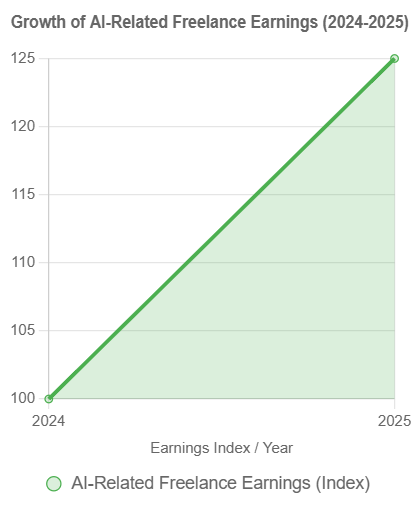
Take John, a freelance writer who used to spend hours researching articles. He cut the time it took him to get ready in half with ChatGPT, took on more clients, and made 30% more money each month.
Challenges and Considerations
AI tools are useful, but they aren’t perfect. Things to remember are:
- Check Outputs: AI can get things wrong. Always check the sources of Perplexity or proofread Grammarly’s suggestions.
- Learning Curve: Tools like Notion AI may take time to set up for your workflow.
- Cost vs. Benefit: Premium plans (e.g., ChatGPT Plus, Canva Pro) add up—prioritize tools with the best ROI.
- Ethical Use: Be transparent with clients about AI use to maintain trust, especially for creative work.
Future Trends: AI in Freelancing for 2025 and Beyond
The freelance world is evolving, and AI is at the forefront. According to Globanz, AI freelancing jobs like prompt engineering and data labeling are booming, even for beginners. Platforms like Upwork and Fiverr are using AI for better job matching, with AI-related freelance earnings growing 25% year-over-year. Staying ahead means adopting these tools early and upskilling in AI-driven services.
FAQs About AI Tools for Freelancers
What is AI and how does it benefit freelancers?
AI learns to solve problems by understanding human thought processes. It helps freelancers by handling repetitive tasks, offering valuable data insights, and boosting creativity, so they can focus on what truly matters.
How can AI be used in freelancing?
AI helps with a lot of things, like making content (ChatGPT), designing graphics (Canva), managing projects (Notion AI), translating (DeepL), editing videos (InVideo AI), analyzing data, and more. This makes work easier and more productive.
Which AI tools are recommended for freelancers?
ChatGPT is great for writing and coding, Grammarly is great for writing, Canva is great for design, Notion AI is great for project management, and Perplexity AI is great for research. Pick what works best for your niche and needs.
Conclusion: Work Smarter, Earn More with AI
Freelancers who want to stay competitive in 2025 need AI. You can save time, do great work, and grow your business with tools like ChatGPT, Grammarly, Canva, and Notion AI. You can make more money and work more efficiently while keeping your clients happy by picking tools that fit your niche, trying out free versions, and using AI in a responsible way. Start using these tools right away, and your freelance career will take off!
Don’t Miss This: How to Make Money Using AI in 2025: 25 Best ideas
Don’t Miss This: How to Start an AI Freelance Jobs in 2025


